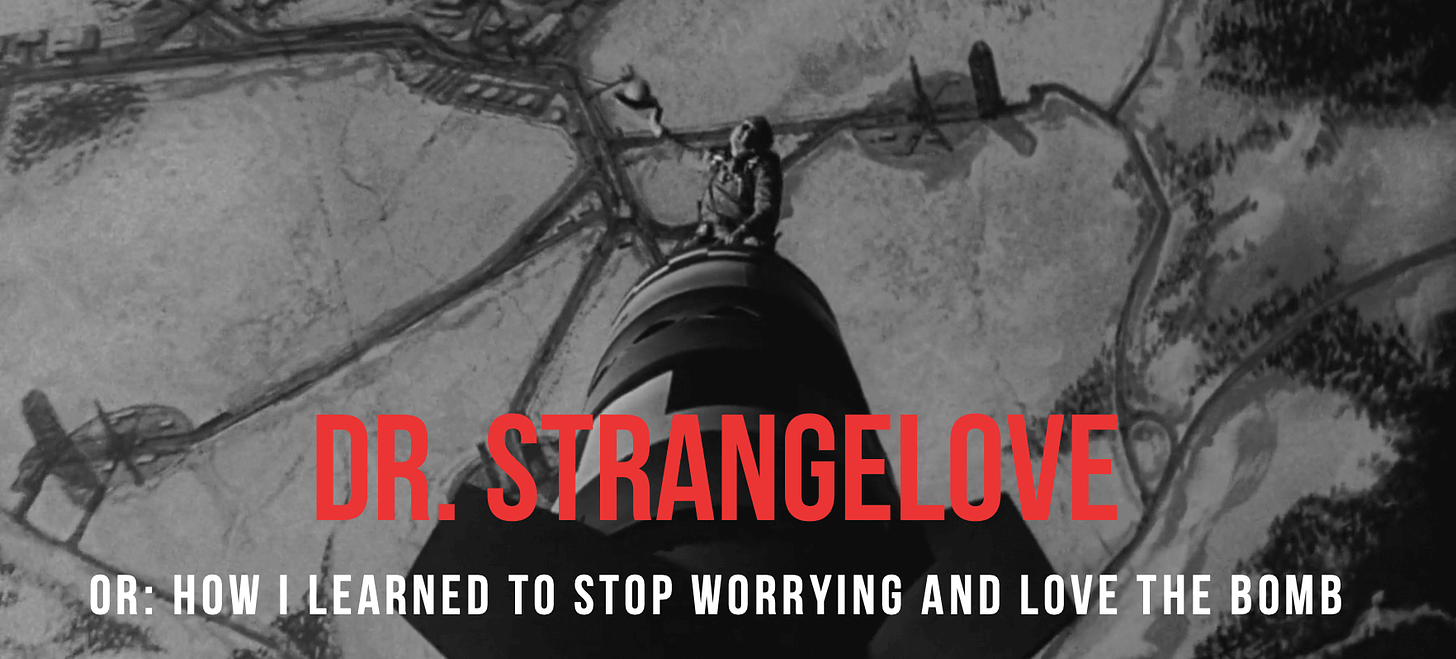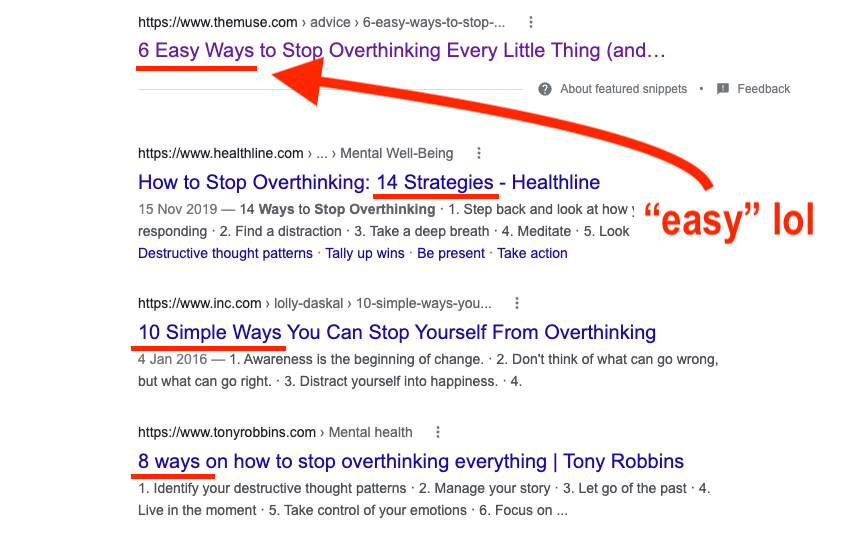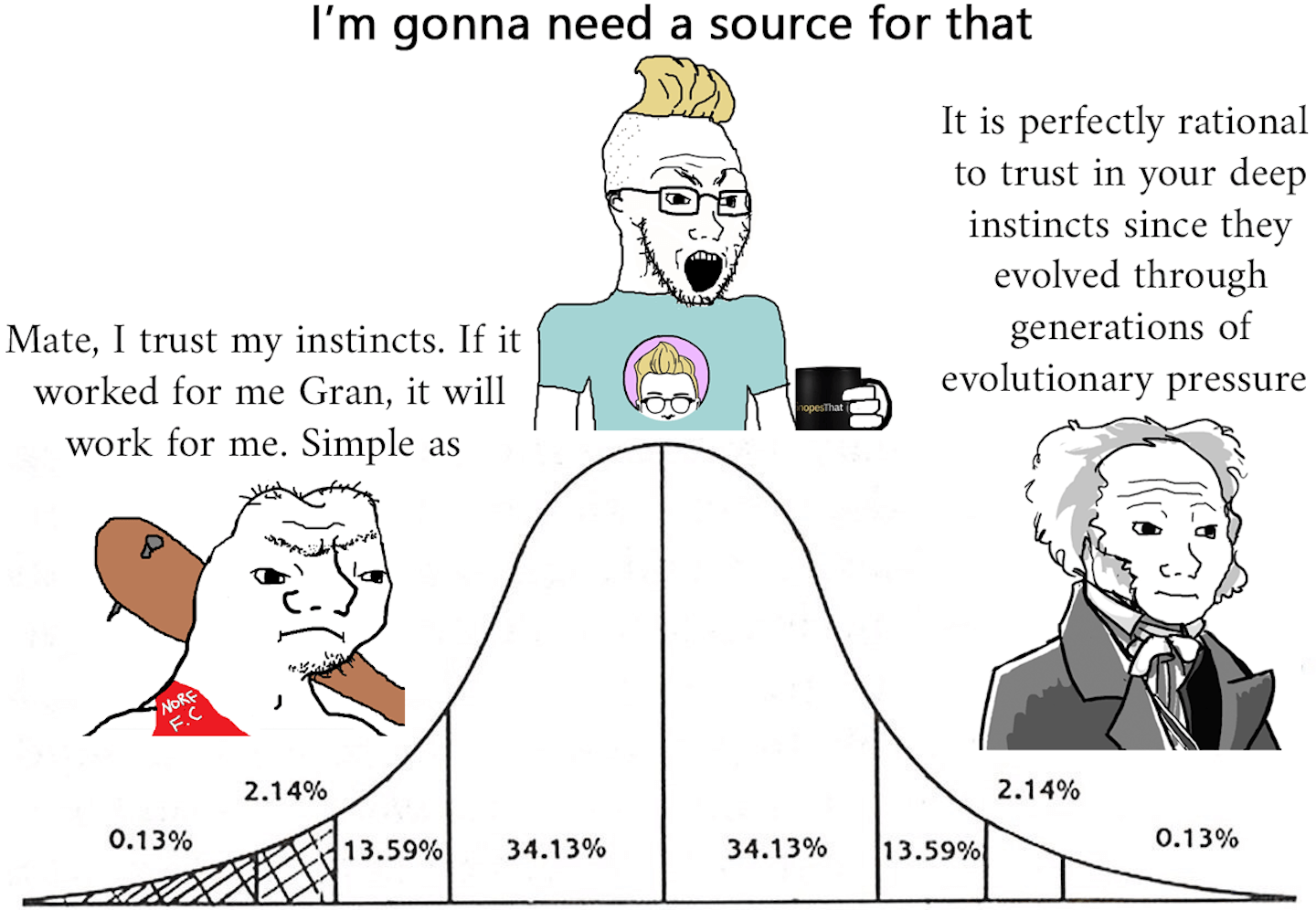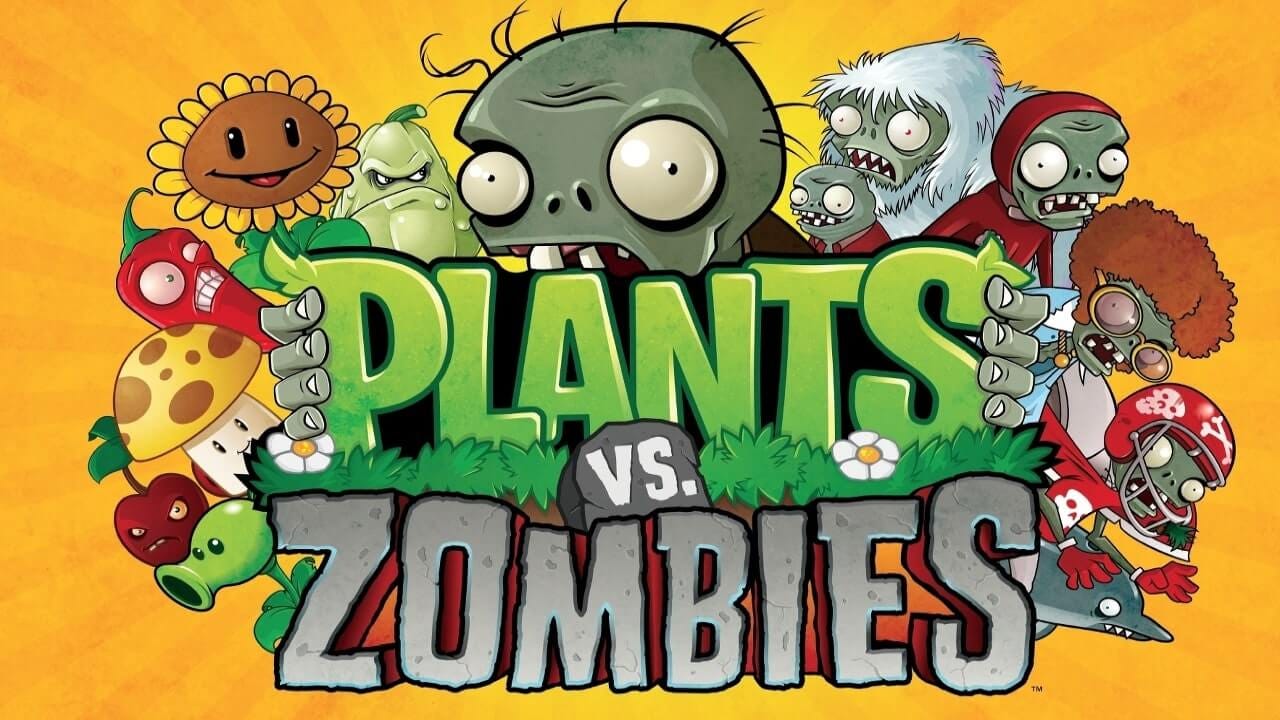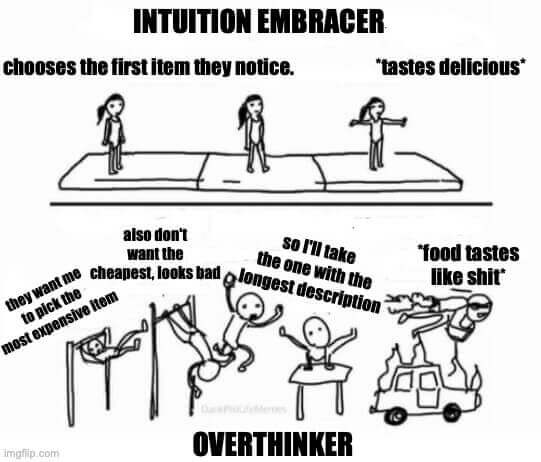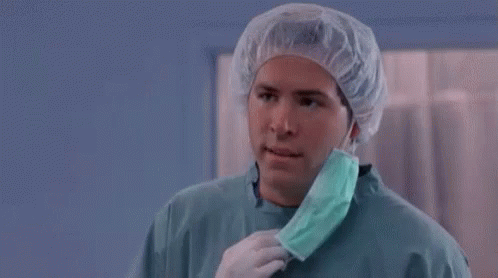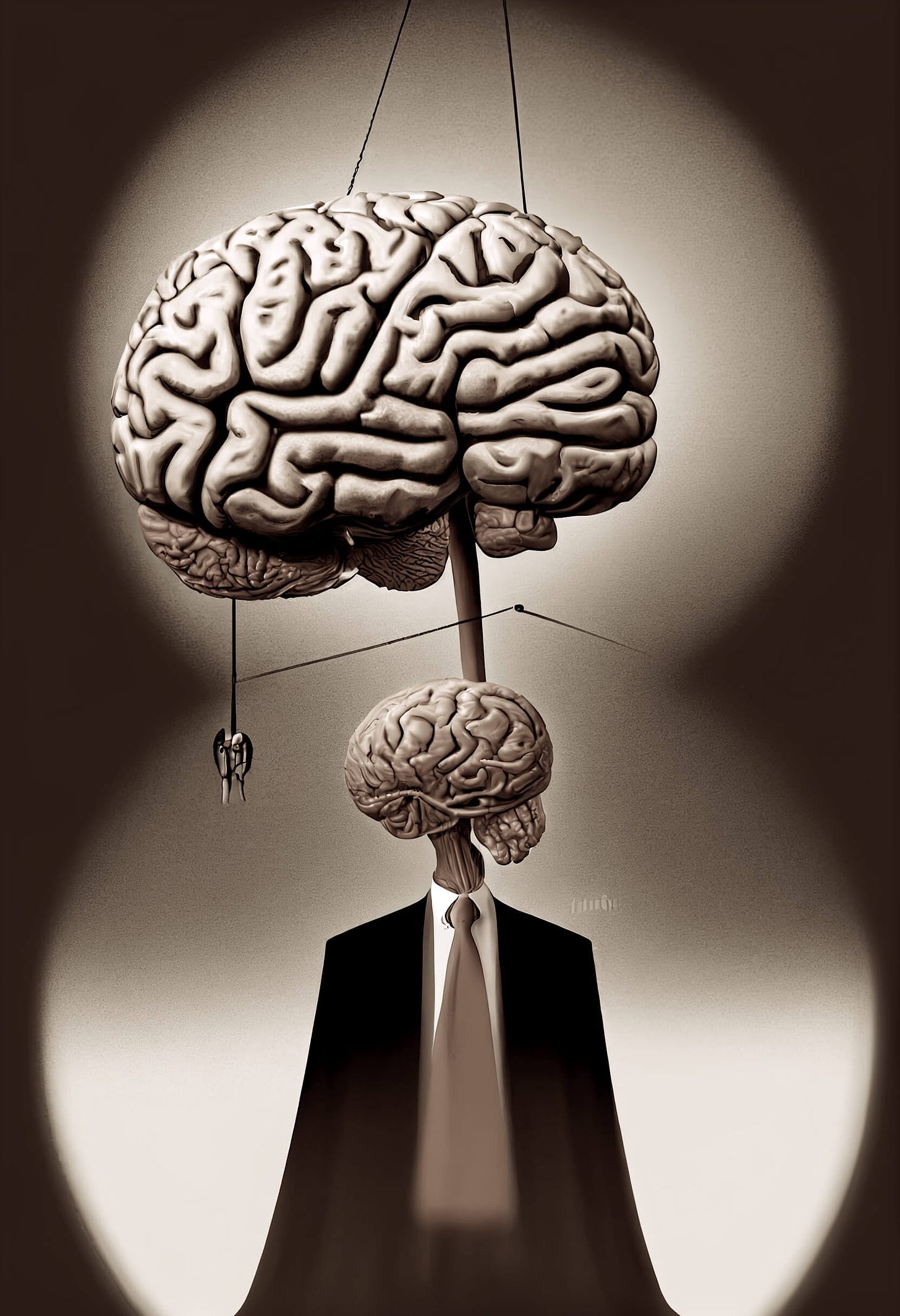Dr Strangelove — Or: How I learned to Stop Overthinking & Love the Doubt.
Embrace intuition, love uncertainty, stop overthinking.
PREAMBLE:
Hey friend, this is my most personal piece to date. I know it’s freaking long, three times as long as my previously longest piece, in fact (I checked).
But bare with me. It has humor, storytelling, and from the midpoint on, a recount of two of the most intimate & defining moments in my life.
Also, if you’re an overthinker, this is especially for you. ❤️
“She’s surprised us so much already; let’s give her a bit more time.”
Gigi nodded and grabbed my hand as we looked a the screen monitoring our baby girl’s vital signs.
Hey friend, after overthinking this piece for more than half a year now, I’m finally writing it. You’d think publicly committing to this article would help me finish it sooner, eh? Guess the opposite is true. So this will probably come in just as the doors close on Tasshin’s contest.


No matter. The most important thing is that I’ll finally have written this article that gave me so much dread.
Yes, I feared writing and publishing this.
Why? Well, I’m such an insane overthinker.
It’s an underestimation to say I must have wasted years of my life overthinking things. So, feeling I have some expertise on overthinking, on the experiential end at least, I want it to be a good essay. (And what better way to get a chronic overthinker to overthink more than to make him join a contest and fear something won’t be good enough?)
As I said, I’m happy—the kind where you’re finally free of suffering happy—to finally post this. So without further ado, I’ll introduce the day’s topic, starting with the cheeky title.
Introduction
You might have heard a similar phrase: “Dr. Strangelove or: How I learned to stop worrying and love the bomb.” It’s the title from an old comedy movie during the cold war, where the threat of nuclear war was hanging above everyone’s head. (Sadly, we’re kinda back there again, aren’t we?).
One of the lessons we can draw from the movie is that you can try and prepare for everything, even the worst, but that, in the end, things will most likely turn out way more different than you could’ve planned for. Like the movie, I want to tell you that living in constant fear and planning for everything won’t make you happy. I’m saying that when you let go—embracing the situation and surrendering to the unknown—it will make you happier and open you up to the world’s wonders.
Now, wasn’t that easy? No need to read this whole article!
I wish it were that easy.
Over the years, I’ve read so many things about how to stop overthinking—there are more listicles out there on “how to stop overthinking” than you can read in a year—but few things help. It’s because they miss the mark. By a long shot.
After all, they focus on the symptoms of overthinking instead of the origin.
So my promise to you is that you won’t find any listicles here, such as “6 Easy Ways to Stop Overthinking.”
I’m not simply a prescriber of pills to rid you of overthinking symptoms.
I want to help you zoom in on the root cause.
I believe the power to reduce our overthinking lies within ourselves.
Hence, my goal is to take you on a journey. Not merely to show you what you shouldn’t do—when has “don’t think of a pink elephant” ever worked?—but to invite you to look into yourself. I believe the power to reduce our overthinking lies within ourselves.
Note that I say “reduce,” for I don’t want to make promises I can’t keep. With a lot of experience that helps me reduce my overthinking, I’m still not free from it; just take me writing this article, for example.
What’s in this memoirticle?
As this will probably be a bit of a long article, I will link to the different parts in the next paragraph (oh, you’re so meta Jibran).
First, I’ll show you why overthinking sucks b@lls (as if you didn’t know that already). Namely: it’s (surprisingly?) irrational, it paralyzes you, it makes you inauthentic, and it turns you into a zombie.
Second, I’ll show you the gift of your intuition and how you can embrace it.
Third, I’m sharing my story of surrender1 with you so you can see for yourself why letting go is the ultimate power and how that realization can reduce your overthinking.
Lastly, I’ll offer my closing thoughts, summarize the main takeaways, and give thanks.
Throughout all this, I will share both shitposts and earnestposts from Twitter, and of course, some memes (what would a good article be without memes these days).
Oh, and make sure to look at the footnotes! I took extra care to provide some funny, weird, and exciting references, resources, and (in)side stories. (Among which I'm referring to cool folks (read: Twitter friends I admire) as well).2
OK, ready for liftoff Dr. Strangelove?
Overthinking sucks @ss, but why?
It sucks because you’re “mid.”
Mid, as in the guy in the middle of this godlike meme (and nobody wants to be in the middle of this meme).
The chronic overthinkers in the middle part of this meme are the ones that, for one, are usually wrong. Two, they are slow to act. Three, act “fake” or inauthentic, and four, sadly, are not “alive.”
Let’s look at each of these failure modes of overthinking in detail.
Seeming rationality is irrational
As the mid guy, you make choices based on what other overthinkers say, who are often also wrong.
“Source?”
You get into an echo chamber of guys—cause it’s predominantly guys—that try to solve some grandiose problem. They get all nerdy about it and find a “solution.” But the solution is for a completely wrong problem they chose to focus on. They hoped to be LessWrong but are often just mistaken in different ways.3
Why are these overthinky decisions so often aimed in the wrong direction?
It’s cause fear is a lousy advice giver. Overthinking gives you a bias of looking towards extreme outlier dangers as if they’re close by. I.e., your fear starts asking—and coming up with—the most extreme bad things that can happen and weighing them equally with less harmful or more easily solvable things.
That anxious thinking is not rational. At all.
A good example (though some of you might want to cancel me because I have this opinion ;)) is the blanket (blind even?) lockdowns during Covid. Where the second, and third-order effects were, or still are, way worse than the virus itself in many instances.
But here’s a less politically charged example if you’ll allow me to open up a little bit.
I must confess that I didn’t dare kiss my newborn son on his lips or cheeks during his first two months of life because I was afraid of making him ill, with a virus no less. (Guess how my baby boy must’ve felt in the arms of such an anxious dad.)
You may notice these two examples are not so different from one another: both are based on extreme fear, both are a flinch response to the fear, and both aren’t taking into account the 2nd (and 3rd) order effects.
Other than making less-than-ideal decisions when overthinking, you can also fall into the trap of making no decision (of which I have also been guilty). So let’s look at that next.
Analysis paralysis leads to fatalysis
Yeah, I made that word up. But it fits, so Imma just gonna use it. (Please email me at idgaf@jibranelbazi.com if you have a problem with that.)
When you stop to analyze for too long, you die. No really!
To use an extreme example4: say you’re on the road when an oncoming truck is almost going to hit you. Jump left, and you live. Jump right, and you’ll live as well. But standing there, indecisive because you’re overthinking which way to jump, gets you killed.
There’s been countless myths and fables around this, and one I particularly like is that of Buridan’s donkey.5
I’ll shortly tell the story of Buridan’s donkey (you can just skip this if you know it):
There’s this donkey that is equally thirsty and hungry. Food is to his east, water to his west at precisely the same distance from him. If he eats, he lives. If he drinks, he also lives. But he doesn’t know what the better choice is, so he chooses nothing and dies.
Stupid donkey.
If you’re a chronic overthinker and have looked for stuff online around this in the past, there’s a chance you’ve seen this amazing talk by J.K. Rowling. In it, she says something that’s stayed with me for all these years: “It is impossible to live without failing at something, unless you live so cautiously that you might as well not have lived at all – in which case, you fail by default.”
“It is impossible to live without failing at something, unless you live so cautiously that you might as well not have lived at all – in which case, you fail by default.”
Better to fail through action, than fail by default.
Making a choice is almost always better than doing nothing at all. A choice leads to new insight, which helps you to make your next choice better informed. Not taking action and trying to overthink it all beforehand is like planning a journey across undiscovered terrain and prepping for all possible outcomes. You’ll never be done prepping.
So, no choices, no action, and no action, no life. But let me show you how faux choices aren’t much better.
If you fake it, you’re Not Gonna Make It
“NGMI” for the zoomers (genz’ers? I don’t know anymore, I’m a Millenial, I’m told).
One of the many fears we overthinkers deal with is the fear of not fitting in—which, I’d argue, is frankly the most grounded fear of overthinkers. What often happens is that we can fall into the trap of thinking that we can “fake it until we make it.” “It” being the personality traits of others that we believe are important to show (even if they don’t naturally fit us).
But most people, especially non-overthinkers, can smell the fakeness from a mile away.
And who wants to befriend a faker, a mask?
Now that may be a bit harsh, but still, if people want to see a performance, they can just as well go to the circus and watch clowns act.
To be clear, acting inauthentically is definitely not only an overthinking thing. It is based on the fear of not fitting in, and everyone has that to some degree. (#instagram #linkedin anyone?)
But overthinkers can just fall into acting like clowns more easily because they try so hard. And I don’t like clowns. (Though maybe I dislike clowns because I accidentally watched IT as a seven-year-old. During a thunderstorm. Alone…)
Resign from the club of the living dead
You’ve probably consumed some zombie movie, series, or game. Ever notice what all those zombies have in common (other than being slow, fighting plants, or lusting for your brains)?
They’re walking shells of their former selves. That’s you when you’re overthinking.
You’re the zombie.
When you’re overthinking, you’re not living in the moment. You’re living in the future or past.
You’re not alive.
And that’s sad. Cause we need more aliveness.6
To put it bluntly, you weren’t put here to merely be another speck of matter. You’re here to be this profoundly unique and beautiful instance of consciousness in the vast ocean of existence.
You, yes you. You, mf’ing divine being that you are, have the literal composition of matter to matter. To yourself, and others.
But that’s a bit difficult when you’re working for Zombiecorp.
So, hand in your resignation letter at ZR (Zombie Resources for the uninitiated) and start being alive again. To be in the present, in the here and now. For the past and future don’t exist, my big-brained friend.
This is actually an excellent segue to discuss the how of reducing your overthinking. So let’s start with looking at that truly and profoundly human thing.
Your intuition. You know, that thing you put away when you’re overthinking?
Embrace your intuition
Do you ever notice that when you make a choice, but then overthink it and choose differently, you find out that your first choice was actually the better one? Yeah, that’s your intuition knowing way more than your dumb ass intellect can access.
Overthinking caused you to make the “wrong” choice and it took longer.
Now imagine making most of your choices based on intuition vs. overthinking them.
You’d iterate way faster.
These iterations will make you learn more quickly, giving your subconscious more accurate (new) information with which it can, again, make better choices.
When the decisions are not lethal, it’s almost always better to go with your gut (with life-or-death decisions often as well, but it can be a bit nuanced, we’ll get to that later).
How do you embrace your intuition?
Where does your overthinking come from? Often, it’s (childhood) trauma.
Usually, this hidden trauma functioned as a “dark protector.” But as much as this protection was a necessary coping mechanism from a past life, it’s likely not serving you anymore.
First, to dissolve and accept the trauma that causes you to overthink, you must bring it into the light so that you can understand it. Only then does it lose its power.
Then, when its power has dwindled, you’ll find you can hear your intuitive voice much more clearly.
It’s beyond the scope of this article to go into the details of each method of understanding and dissolving (read: accepting) trauma. But let me say that it’s been of enormous value to bring my fear monsters into the light and slay (read: hug) them.
The second part of embracing your intuition is knowing you can trust yourself.
But that’s difficult if you’ve gone decades without trusting yourself (cause there was always this dark protector whispering other things in your ears).
So you need to prove to yourself that parts of you don’t have different intentions than what’s best for you now.
I’ll go into both understanding yourself and trusting yourself in the next two sections.
Understand and accept yourself
There are many ways to understand and work with your trauma (I specifically say work with trauma, for it is a part of you, and you can’t just cut it away). The ones I have experience with are journaling, MDMA, psilocybin, (talk) therapy, (self-administered) EMDR, and a little IFS (internal family systems). (Yeah, I was (still am? 🤔) a fcked-up SOB, so there was a lot to understand and accept, you might say…)
As I said, the details of this self-acceptance subtopic are way too complex to also go into in this article. (Plus, I’m not a doc or therapist, so I don’t want to recommend specifics for anyone cause I don’t know your uniquely messed-up situation 😘).
I have written two previous posts on my journey of self-acceptance if you’re interested though.
If I’d summarize this point, though, I’d say instead of punishing and hiding your dark protector, give them a hug. ❤️
Trust yourself
“Jibran, you bastard, you led me all the way here to tell me I should trust myself? That’s the whole goddam problem for why I’m overthinking in the first place. I don’t trust myself!”
Yes. Yes, I am sorry, you’re sorry. But let me explain.
You’re trusting yourself to wipe your own butt, right? (Please. Please indulge me; I’m not fucking with you here.) Or you trust yourself to make yourself a sandwich or a cup of tea. (Now, these things may still be difficult for a tiny minority reading this, but you get what I mean.)
What makes it that you’re not overthinking those acts?
Two things:
The acts are very small
You’ve done them hundreds or thousands of times.
You’ve proven to yourself that you have no problem doing them again and again. You trust yourself that you can do it because you got proof.
Now imagine something that you regularly overthink. It’s probably something you don’t do very often, haven’t ever done, or it’s a big act (or any combination of these). You don’t have proof yet that you can do it (repeatedly) or how the decision will impact you.
So, you need to gather proof.
How? Well, I’m glad you asked, my curious friend. What you need to do is to make your world and actions smaller.
Do you remember this scene from the movie “Man of Steel” where Clark Kent, as a kid before he became superman, hides in a broom closet?” Probably not, so I’ll quickly tell you:
Clark’s powers were overwhelming him, and he could “sense” the pain of the whole world. To try and hide from the pain he’s locked himself in a broom closet in school, and his mom comes to his rescue: “The world’s too big, mom,” he says. And then his mom, full of compassion, says to him, “then make it smaller.” (I know it’s just another Hollywood movie, but I always tear up when I see that scene cause it resonates just so much.😭)
This reminds me; I actually wrote about this scene and this topic years ago as a response to a depressed online soul. You can find it here.7
“The world’s too big, mom.”
“Then make it smaller Clark.”
It’s precisely what we should be doing too—make our world smaller—as a way to gather proof for ourselves that we can do the big thing we fear doing.
We need to be small action maxing. We need to be making decisions and goals so small they seem laughably easy. We must imagine Sisyphus laughing his ass off carrying the boulder—crushed into tiny rocks—up the mountain.8
Surrender to uncertainty
Now that you know you already contain everything within you to take on whatever comes your way, you can surrender to uncertainty. But why?
Well, when your default perspective is surrendering to the unknown, you’ll find you’ll come across exciting and serendipitous moments. Situations you wouldn’t ever have noticed and people you wouldn’t ever have connected with.
But when you’re overthinking, it’s like you have blinders on.
Your vision is blocked—or tunnel vision at best—as opposed to the expanded awareness and vision you can have of the world when you’re open to it.

This openness to the world happens because you’re OK with things not always being under your control. So you allow yourself to veer off of the beaten path and come across undiscovered meadows full of Disney-like birds, deer, and flowers. (I’m describing a hike my wife and I once did a decade ago into the Spanish Pyrenees of Ordesa.)
On the other hand, wanting control means you have the urge to fit everything within your (flawed) world model. It doesn’t allow for miracles to happen because miracles, by their nature, are too random.
I believe this “letting go” can be learned consciously, though. Two methods that come to mind are somatic work (or bodywork) and meditation.
Aside: folks like Michael Ashcroft and Elena Lake come to mind concerning somatic work, while I’d refer to someone like Gabe or Tasshin for meditation (they both have weekly meditation groups). Then there's Niko on improv and Sasha on "non-coercive" writing as well.9
But many people still have to go through an ordeal or existential crisis (or both) to realize they can surrender to—and love—uncertainty.
So I’ll show you what life events helped me (read: forced me) to realize that surrender is even a possibility.
How to surrender to uncertainty
I surrendered to uncertainty by deciding it was OK for my daughter to die.
“Wtf Jibran.”
Yeah, I had to go 3k+ words deep into this post to feel OK saying that publicly.
This may be why I had such a hard time writing this piece. Because I knew I’d have to fit some of that story in here somehow cause it’s what made me genuinely see I only have so much control.
The story is long, beautiful, painful, miraculous, and, unbelievably, has a happy end; one novel’s worth would barely cover it.
Still, I will attempt to take you through the core part related to love and surrender.
Oh, and know that I have a whisky to help me write this section (and maybe you’d want to grab one as well, reading this next part)…
Realize you don’t have (that much) control in the first place
When my wife, Gigi, gave birth to our daughter, Daisy, in the spring of 2017, I had no idea that 12 hours later, we’d be in the 3rd hospital within that same time and 100+ miles away from home. No amount of planning or overthinking could’ve prepared me for that.
But not for lack of trying (to prepare and overthink everything).
First, I’ll take you back a few years before that moment. Back to the time my son was born. I’ll tell you about why my wife—sometimes lovingly, sometimes judgingly—called me “Measurement Man.”
I’ve always had the need for control. This obsessive need to measure every situation to a set of standards (my standards, which were never good enough) and weigh every option so I could feel confident in my decisions (hint: that never worked).
This was no different when our son, Bran, was born in 2015 (it honestly made me even more of a control freak). I tried to measure everything that had something to do with him. From the exact amount of milliliters of milk he drank when we gave him the bottle—good luck figuring that out with Gigi breastfeeding as well, Jibran—to weighing his diapers, trying to deduce if he didn’t lose too much fluid.
As I mentioned earlier in this post, I was an extremely anxious dad. All stemmed from the fear that something terrible would happen to Bran and the fear that I wasn’t good enough as a dad.
Of course, there was a price to be paid for this way of living.
The unrelenting fear and anxiety meant I was constantly suffering. (Even before I became a dad, I was kinda depressed and had quit my job just two weeks before Bran was born.)
I just couldn’t get out of it, so, at some point, the temptation to end my own life started to crawl ever so slightly into the back of my mind. But I didn’t talk about it with anyone cause I thought, “man, how can you be unhappy? You just became a dad of a healthy son!”
Then one particular night, when I, again, had woken up from Bran crying and couldn’t get to sleep again, I heard the sound of a train come through the half-open window.
I could hear the trains every night if I paid attention, but it sounded like a siren's call this time…
“In just 10 minutes it could all be over, Jibran.” a voice in my mind said. “Just lay your head on the tracks. No one will see it at night and away from the crossing.” 10
I went downstairs and walked across the dark living room, and as I saw the outlines of Bran’s toys scattered on the ground, my little boy’s face came to mind.
“In just 10 minutes it could all be over, Jibran. Just lay your head on the [railroad] tracks. No one will see it at night and away from the crossing.”
But then I thought of my son.
“I can’t let Bran grow up without a dad; I just love him too much,” I thought.
As I sat down and grabbed a toy, tears pouring down my face, overcome with boundless love, I partially “popped out” of myself (not unlike what people sometimes describe they experience during meditation). I sat there the rest of the night, staring into the abyss of my soul, and made a vow that I would never take my own life, no matter how much I’d suffer, as long as I could be there for my kid.
As destiny would have it, I was to be tested on my vow only a year and a half later, for what I most feared could happen to my son happened to my daughter.
Daisy was born with a rare, high-mortality-rate condition.11 And in the sixth week of her life, after three surgeries and many near-deaths, doctors asked us if we wanted to take her onto our lap so she could die in our arms.
Do the best you can, then let go
It was the coldest 20th of April in exactly twenty years (coincidentally, the coldest 20th of April before that was exactly 100 years earlier).12 Gigi and I were sitting next to the NICU13 crib Daisy was lying in, motionless, monitors not beeping anymore, even though her vital signs were all in a state of emergency. The nurses had turned off the sound to give us some peace.
“You can take her in your arms if you want to.” the doc said to us. “Even though she can’t respond due to the rocuronium,14 she can feel you. Maybe it’ll make it easier for her to pass.”15
The moment we feared all that time had come. Daisy’s oxygen levels could not stay high enough to keep her alive. In the six weeks before this moment, we gave it our all and had tried everything, but nothing seemed to help. (And as a “proud” atheist at the time, I even prayed to a God I didn’t believe existed for the first time since I was 8.)
Gigi and I were at our wit’s end and finally couldn’t do anything else than let go and put Daisy in the hands of destiny.
You’ve fought and suffered long enough, my little girl. It’s out of our hands now. I thought.
“You can hold her,” I said to Gigi as we looked at each other with red eyes, though no tears; we had shed so many earlier that night. None were left.
“Let’s first call our friends and family,” Gigi said.
The hospital where we were was 100+ miles from our home, so we lived on the hospital grounds (the one thing I am McDonald’s eternally grateful for is the Ronald McDonald organization). That meant all our friends and family, including our son, were three hours’ drive away. We knew they wouldn’t be there when Daisy would pass, but we wanted them to come and support us after.
Us calling during the night at 4:00 AM meant that everyone who picked up knew what was up. So a quick exchange of words was enough:
Ron: “It’s happened?”
Me: “Not yet, but we’ll take her in our lap in a bit.”
Ron: “Ok, I’m on my way. Take care. Love you man.”
Me: “Thanks.”
In the ten or so minutes it took to call our loved ones, we saw Daisy’s oxygen levels rise a few percentage points, where earlier it had solely been a downtrend. Gigi and I looked at each other, understanding each other fully, reading each other’s minds.16
I gave words to what we both thought, “she’s already surprised us a few times; let’s give her a bit more time.”
“she’s already surprised us a few times; let’s give her a bit more time.”
Words I will never forget.
Gigi nodded and grabbed my hand as we looked back and forth between Daisy and the monitor with her vital signs.17
That moment felt as if we were on a different plane of existence. As if we were in the presence of an unseeable force that could see right through us and tell if the faith we placed in the hands of destiny was sincere or not.
As if the force asked, “Have you truly let go?” And we answered, “Whatever happens; it’s OK.”
Daisy’s oxygen levels rose to around 65%, enough to keep her brain from failing for a few more hours, then to the high seventies and low eighties.
The next few hours were a blur of surprised people coming into the NICU one by one. Nurses were dumbfounded cause they expected Daisy to have passed during the night shift. Doctors, some working 30+ years in the NICU, looked on, mouths wide open in astonishment, at Daisy’s vital signs. Family and friends came in to offer their condolences, amazed to hear medical personnel talk about trying a last risky procedure.20
Over the rest of the morning, more miracles happened.21 Miracles that connect back to things in days, weeks, and even years prior that set us up to save our daughter. (But with 6k+ words in this article already, it’s something I’ll have to talk about another time. And on a more meta level, it’s also not related too much to stopping overthinking.)
For now, know that Daisy is still with us, almost 6 years later. She’s the happiest person I know (and I’m not just saying that because she’s my daughter). It’s such a gift22 to be her dad, and her presence reminds me, every single day, that letting go brings us all closer together.
Closing thoughts
OK, time for a bit of meta-analysis: I feel I must apologize somewhat for telling you such a long story for what is supposed to be an informational article. The second half turned into more of a memoirticle (ba dum, tsss?), which wasn’t what I meant to do, but I guess it is what I was driven to do.23
So it is what it is.
That doesn’t mean it isn’t helpful for you, though. I feel the most profound change comes from feeling something. And I hope you can feel something resonate within you after reading all this.
Also, didn’t I promise I wouldn’t make a listicle post? 😉
I think I owe you a good outro, though, so let me summarize the main takeaways as it relates to overthinking. (Cause you came here to stop overthinking, right?)
You already have it in you
What more is there to say?
You’re good enough. You don’t need to have it all figured out before making a decision cause no one expects you to have it all figured out. (Except you and other overthinkers.)
You’re good enough.
As an overthinker, you’re looking outside of yourself for that which you can only find within. So when you start listening to your inner voice—your intuition—it means you’ll figure out your desires, and you get to follow them instead of someone else’s.
Remember there is so much beauty, power, creativity, and the possibility of connection within you. But submitting it to an external will, containing it in a flask too small, will only make you bitter.
So embrace what you already have, listen to your inner voice, and let out the genie in you; then, all your wishes will come true.
Surrender sets you free
If you could control everything, you’d be omnipotent. You’d be a god.
As a god, you’d get bored cause there is no one else to play with. No connection, no playmate. So as this omnipotent being, you’d make a universe where you hide yourself in everything.
Every particle, every abstract equation, every cell of every body, every thought of every person, all that is you. All made so you purposefully don’t have control.
Thus, connecting with (the divine in) others and (the divine within) yourself means merging these powers from the source. So then, tapping from that beautiful source allows you to actually have the control you aspired to for so long.
But you only gain the power to make that meaningful change while in connection with others (instead of trying to do it alone and with solely your intellect).
And the only way to connect with others is to let go of what you want from them and let them be who they are.
Then, to connect with yourself, let go of what you want from yourself, so you can let yourself be who you are.
Let yourself be who you are.
Embrace whatever may come
As a final note, and takeaway, I want to share this song from Tool. I listened to it so much as a teen, but never really listened to the lyrics. I didn’t get them at the time, not consciously. But it probably resonated within me on a deeper, subconscious level. (I only got the message half a life later (damn I’m stubborn).)24
Over thinking, over analyzing separates the body from the mind
Withering my intuition leaving opportunities behindFeed my will to feel this moment
Urging me to cross the line
Reaching out to embrace the random
Reaching out to embrace whatever may come
Embrace whatever may come.
Thank you
Thank you, dear reader, for hearing me.
Thank you, my boy, you saved my life.
Thank you, my girl, you saved my soul.
Thank you, my wife, you made me whole.
Thank you, dear friends and family, for your love, patience, and shoulders to lean on.
Thank you, nurses, doctors, and other healthcare staff, for you allowed us again to laugh.
Thank you, Tasshin, for offering a contest that helped me put a part of me to rest.
This is not quite a book (though 7.3k is the furthest I’ve gotten to one). Seems Tanya is on point with her reply to my question on Twitter though: “You log on and see that I’ve written a book. What do you assume it’s about?”
Mostly Twitter friends in the (meta)rationality/TPOT/whatever-you-want-to-call-it sphere that are doing fantastic stuff around this topic.) tpot = “This Part of Twitter”
There’s a whole slew of posts I could write here on second-order shitty effects of overthinking-induced rationalization. A current prime example where this is happening a lot is in the—good-intentioned—Effective Altruism movement which hangs around a lot in the LessWrong community (cult?).
This TikTok “no-a-psychologist” thought it was a good example though, (but for something else entirely). Funny to see overthinkers respond the strongest to her take as well 🤭.
Buridan’s donkey: https://en.wikipedia.org/wiki/Buridan%27s_ass
Instead of lingering in the past or worrying about the future, focus on the here and now, so you become alive and create beauty.

More cool stuff from Rob.
My friend Niko talks a lot about improv and zen for example:
And Sasha writes amazingly on letting go (with relation to writing) as well:
Little did I know that I was the first on the scene three years later to try to help a young woman who threw herself in front of a train. Let me just say there was no one there to offer help anymore, and I had to throw away my shoes right after…
Congenital Diaphragmatic Hernia (CDH): https://www.chop.edu/conditions-diseases/congenital-diaphragmatic-hernia-cdh
Our loved ones, en route to the hospital that night, told us they had to deice their car windows in the crisp wind still morning. As if the world was holding its breath, all attention and energy focused on this critical moment to give life to our daughter.
Let me take some room here to talk a little bit about life in the NICU.
Every week felt like the worst we had ever felt, and we thought it couldn’t get worse than this.
But it did get worse.
So sometimes we even looked on in envy at other parents whose baby “only” had one surgery or brush with death. Sounds silly right?
This comes with being human.
Then in other moments, every other day or so, we heard the silent crying of other parents as their baby boy or girl was dying in the NICU, curtains closed around their baby’s crib area for some privacy.
Horrible.
But at the same time, there was also so much beauty in all this tragedy. We as parents from different families helped each other, hugged each other, and took care of each other’s kids (the older siblings of the babies that were in the NICU) as we each had to tend to our suffering baby.
This comes with being human as well.
The NICU is the place with the most compassionate people I have ever met. The courage and strength of everyone in that hospital wing, whether parents or medical staff, was out of this world. ❤️
Rocuronium is a muscle relaxant, used in both healthcare and execution (in the US).
We were told later that it was also vital for the parents to still hold their baby while they were alive, even for a short moment, to help with the grief afterward.
Update Nov 1st, 2022: ~7 hours after publishing this piece, Daisy woke up from a nightmare at 4:19 AM. That was exactly the time her oxygen levels started to rise again on that night nearly 6 years ago. She only wakes up from a nightmare a handful of times during the year, and never that late in the night.
Such a weird coincidence.
Gigi says I’m seeing patterns where there are none. But it is Halloween night after all. Make of it what you will!
Next to the monitor, hanging from her crib we also had a few photos and a piece of paper with some lines from a poem. We looked at those often…
I know I surrendered cause in the months after all this when we were home, and everything was fine with Daisy, I sometimes went to the cemetery nearby, to the graves of infants and young children, and cry uncontrollably. At that moment in the NICU, I truly surrendered and accepted the fact my daughter would die in our arms in the next 15 minutes. It didn’t happen. But my body still held the memory of that as if it were true.
This week, we’ll be back in the hospital again. Daisy is going for her yearly follow-ups there. Every time we’re there we leave something behind for the healthcare staff in that NICU wing, and people still recognize us when we’re there. (Which isn’t strange, as Gigi and I practically lived there for 3 months.)
Staff still talk about Daisy as “the miracle child” when they come across us. Which feels so weird, but we can’t deny it.
A side note: coming back there has for me, really been a way of EMDR/exposure therapy. the first few times I cried uncontrollably when walking through the halls. Halls Gigi and I ran through to give Daisy a last goodbye kiss before surgery. But not anymore; it’s all good.
Like I say in the paragraph where this footnote is linked from, I’ll talk about the real miracles at some point, cause it’s too long to put here, but can I relate a “funny” thing that was from that miraculous morning? I can right? I’m hiding it here in the footnotes, away from the serious stuff after all…
I now know that even if the worst that can happen, happens, you’re still there, still there to go to the bathroom to surrender to stress-induced diarrhea, even with your daughter’s life hanging by a silk thread. (Not in like the moment of life & death though.)
I even had to take a back door through the other side of the NICU cause I definitely couldn't face our loved ones waiting in the hallway (for various reasons).
Anyway, this is the shit (haha) you never hear from life on the fast lane.
Coincidentally (or destiny?) our daughter’s name means “gift” in a certain language (Daisy is not her real name).
A nice little anecdote on synchronicity as was writing this:
I’m writing this in the sun outside, and my daughter is leaning against me, chilling. I hug an arm around her and then she wants to stand up. But I didn’t notice, and she slips her head onto the seat.
“Ouch!” she says.
“I’m sorry,” I say.
“You should’ve let me go, dad!” she replies.
And I smile at the synchronicity of the moment. Me writing about letting go of her as a baby girl, and she now saying the words, but meaning something different.





